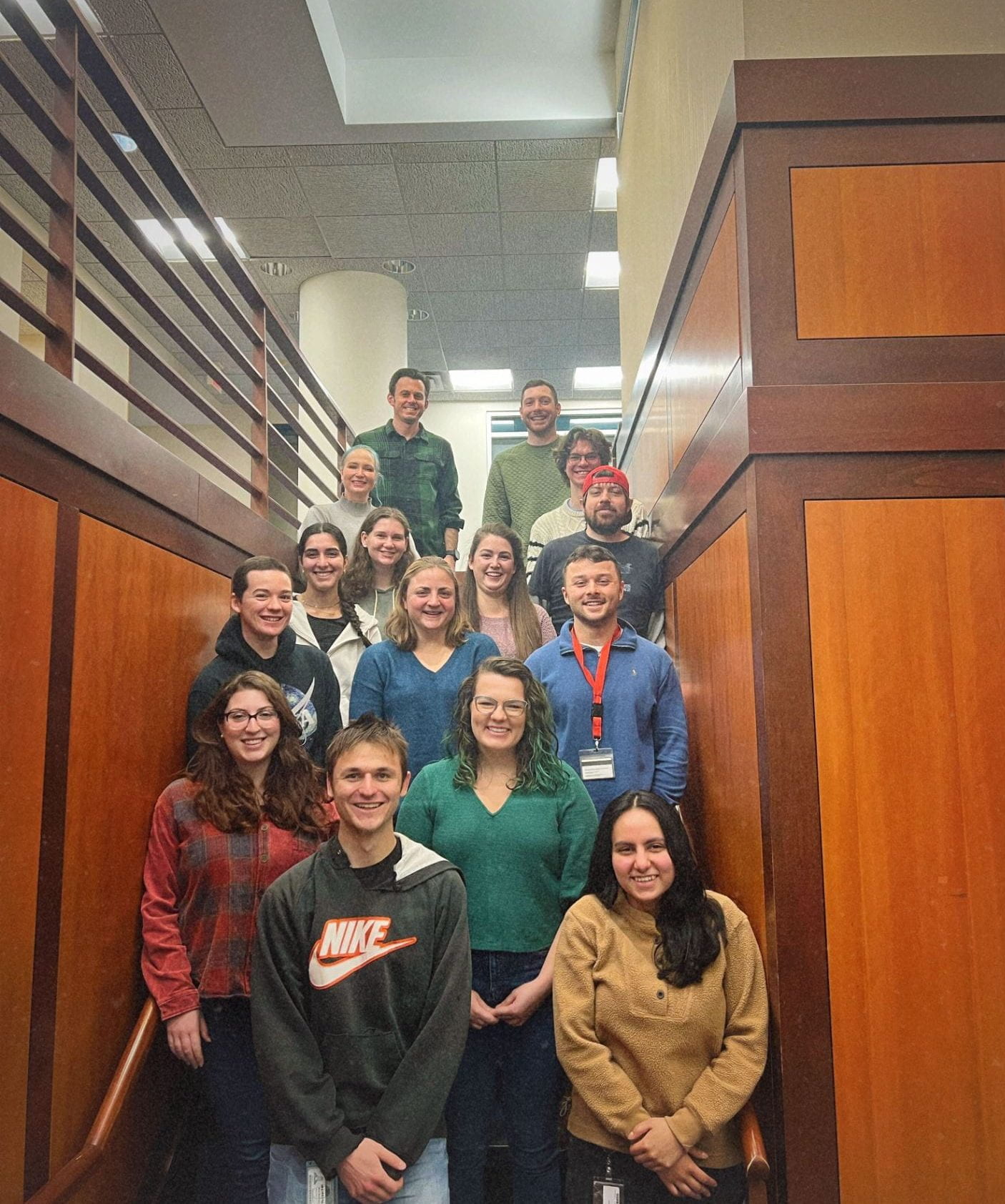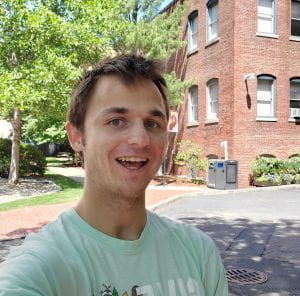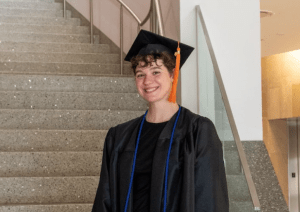Group Members

Principal Investigator
Dr. Abigail Koppes
Dr. Abigail Koppes joined the department of Chemical Engineering at Northeastern University in 2014 where her group, the Advanced Biosystems for Neuroengineering Laboratory (ABNEL), harnesses biochemical engineering methods to address challenges in nervous system disorders and dysfunction. She was the recipient of the NIH R21 Trailblazer in 2017, is a co-investigator on a 2019 AHA Innovative Project Award and is a co-investigator on a 2016 NIH Biomedical Research Partnership R01 between Northeastern, MIT, and Boston Children’s Hospital. She received the 2020 BMES Rita Shaffer Young Investigator and CMBE Young Innovator Award in 2020. She received her Ph.D. in Biomedical Engineering from Rensselaer Polytechnic Institute (RPI) in Troy, New York in 2013. Her doctoral research with Dr. Deanna Thompson focused on using electrical stimulation to manipulate neural and supportive glial cell behavior for improved repair following peripheral nervous system injuries. In 2013, Dr. Koppes joined the Advanced Drug Delivery Research Laboratory with Dr. Rebecca Carrier as the Northeastern University NSF ADVANCE Future Faculty Fellow and held a joint appointment at Schepen’s Eye Research Institute and Harvard Medical School with Dr. Michael Young and as a visiting scientist in Dr. Douglas Lauffenburger’s Molecular Cell Bioengineering group at MIT. At Northeastern Dr. Koppes enjoys teaching Design 1 Lab (Unit Operations Transport I) for undergraduate engineers and Design of Experiments and Ethical Research for graduate students, where she is a member of the DEI and graduate committees, as well as has mentored over 40 undergraduates in the laboratory. She also currently serves on the BMES Diversity Committee.
When not in the lab, Dr. Koppes enjoys cooking, travel, outdoor sports, and spending time with her husband and two Siberian huskies.
Ph.D. Biomedical Engineering
Rensselaer Polytechnic Institute (RPI)
Troy, NY
M.S. Biomedical Engineering
Rensselaer Polytechnic Institute (RPI)
Troy, NY
B.S. Biomedical Engineering
Rensselaer Polytechnic Institute (RPI)
Troy, NY
Google Scholar
 orcid.org/0000-0003-0433-9290
orcid.org/0000-0003-0433-9290
Graduate Students
Bryan Schellberg
Over the past 30 years, organ-on-a-chip devices have emerged as a robust alternative to address the technological gaps associated with current in vitro and in vivo options used to investigate biological questions. Organ-chip models integrate three-dimensional tissue architectures in vitro to recapitulate organ-specific functions, such as liver metabolism and intestinal barrier function. Although organ-chips are rapidly gaining interest, more work is needed to encourage broad adoption across research and industry. Bryan’s work focuses on the technical development of organ-chip devices for real-time monitoring and modulation of cell culture conditions with the goal of improving organ-chip functionality.
Bryan joined ABNEL in the Fall of 2021 as a Chemical Engineering PhD student. Before joining the lab, he graduated with a BS in Chemical Engineering from the University of Rochester in 2021. At his undergraduate institution, Bryan’s research focused on polymer science and new materials discovery. While at Rochester, Bryan participated in a summer NSF Research Experience for Undergraduates, which shifted his interest to biomedical research.
B.S. Chemical Engineering
University of Rochester ’21
Rochester, NY
Brent Buchinger
Parkinson’s disease is the second most common neurodegenerative disease, characterized by progressive losses in motor control and cognitive functioning. While recent work has hinted at a gut origin, research elucidating the mechanisms for this pathological pathway is lacking. Brent’s work aims to develop a novel microphysiological system mimicking the gut-brain axis with the goal of improving platforms for studying and understanding Parkinson’s disease.
Brent joined ABNEL in the summer of 2022 as a Chemical Engineering PhD student. Prior to his graduate studies at Northeastern University, Brent worked as an analytical chemist at Eurofins Food Integrity & Innovation. He obtained his BS in Chemical Engineering at the University of Wisconsin–Madison in December of 2019. At his undergraduate institution, Brent’s research focused on catalysis. However, his passions switched to biomedical engineering after researching chondrogenic differentiation at Case Western Reserve University in the summer of 2018.
B.S. Chemical Engineering
University of Wisconsin–Madison ’19
Madison, WI

Tori Duback
Although many consider the central nervous system (CNS) to be immune privileged, that is not always true. Stem cell derived products have the potential to impact the course of CNS diseases, but there are variable rates of survival and function due to the immune responses associated with disease onset through damaged blood-brain barrier. To improve survival of transplanted cells, current therapies incorporate a battery of immunosuppression medication, which can be challenging to administer to some patients, have compliance issues, and can be a significant source of adverse events. Furthermore, variable timing of immunosuppression has been linked to graft failure. Thus, better understanding how therapeutic cells can evade host immune response could lead to development of future CNS therapeutics having improved cell survival, engraftment, and persistence. Tori’s work will incorporate aspects of Sana Biotechnology’s hypoimmune platform to evaluate the engraftment, survival, and ability to evade the immune system of stem cell derived products both in vitro and in vivo to increase understanding regarding the biological impacts of cell therapies in the CNS.
Tori joined ABNEL in the fall of 2022 as a Chemical Engineering Industry PhD student with Sana Biotechnology. Prior to her graduate studies at Northeastern University, Tori completed her bachelor’s degree at Salem State University and master’s degree at University of New Hampshire. Her master’s research was done in the integrative and organismal biology department under the direction of Dr. Winsor Watson, titled “Localization of circadian clock neurons and investigation of how they influence the expression of specific behaviours in the marine mollusk, Melibe Leonina.” After her master’s degree, Tori worked at Boston Children’s Hospital in the structural biology lab under Dr. Steven Harrison and currently works as a scientist in the translational sciences group at Sana Biotechnology.
M.S. Neurobiology and Neurosciences
University of New Hampshire ’17
Durham, NH
B.S. Biology
Salem State University ’19
Salem, MA
Kat Nilov
Interested in the overlap of space science and the gut-brain-axis, Kat will be taking the NASA SHINE class in 2023 to learn about radiation risk and impact on human health. This interest will lead to the development of stem-cell derived humanized models and eventually the investigation of exogenous forces impact on human nerve, gut, and microbiota response. She hopes to develop a deeper understanding of health challenges exhibited by those in space and on earth.
Kat began their PhD in chemical engineering with ABNEL in 2023, co-advised with Professor Luke Landherr. Prior to Northeastern, Kat completed their bachelors in chemical engineering with a minor in chemistry. She did research in the field of complex coacervates with the Sarah Perry Lab at UMass Amherst. Kat was also involved in projects developing microfluidic chips to synthesize and purify mRNA sponsored by the Craig Martin Lab at UMass. They are committed to making science safe and accessible, implementing pedagogical values in all their work.
B.S. Chemical Engineering
University of Massachusetts Amherst ’22
Amherst, MA
Ziwen Wang
Periphery neuron repair has always been one of the hot topics to scientists and surgeons. Recent advancements in Dr. Ryan Koppes’ lab have led to the development of a method for differentiating olfactory mucosa stem cells (OMSCs) into Schwann cells, a crucial cell type in facilitating nerve function. With that knowledge, Ziwen aims to perform survival surgery to look at the nerve repair. She is hoping her work will yield a higher rate of nerve repair.
Ziwen joined ABNEL in the fall of 2023 as a bioengineering Ph.D. student. Before joining the lab, she had her M.S. in bioinformatics in Northeastern University in 2022. She graduated majoring in biochemistry at Seton Hall University in 2019 and worked as a research assistant in TheWell Bioscience. She also interned in United Therapeutics in 2021, participating in 3D cell culture and bio printing designs.
M.S. Bioinformatics
Northeastern University ’22
Boston, MA
B.S. Biochemistry
Seton Hall University ’19
South Orange, NJ

Jessica Woolston
By age 45, around 20% of women and 10% of men are impacted by Alzheimer’s Disease, the primary cause of dementia. As of 2023, over 6 million Americans live with Alzheimer’s, a figure expected to nearly double by 2050. The economic burden is immense, with costs reaching $345 billion in 2023 and anticipated to soar to $1 trillion by 2050. The gut microbiome, comprising about 1,000 bacterial species, is a key research area, particularly for its role in neurodegenerative diseases like Alzheimer’s, although the complexity of its interactions is not fully understood. The significance of these bacteria in brain function is increasingly recognized, yet their precise functions and interactions remain largely uncharted. The complexity of the gut microbiome, possessing genetic material far exceeding that in the human genome, adds to the challenge of deciphering these interactions.
Jess Woolston, a PhD student at ABNEL, Northeastern University since September 2023, focuses her research on the microbiome-gut-brain axis and its influence on neurodegenerative diseases. Utilizing microfluidic organ-on-a-chip technology, she investigates the role of bacterial extracellular vesicles in these diseases, an approach pivotal for understanding the mechanisms of the microbiota-gut-brain axis in Alzheimer’s disease. Jess’s master’s thesis, which concentrated on the vaginal microbiome and bacterial vaginosis, refined her expertise in microbial analysis and laboratory practices. This formative period played a significant role in shaping her current research pursuits, particularly in her understanding of complex biological systems and their influence on human health.
M.S. Biomedical Sciences
Ghent University ’23
Ghent, Belgium
B.S. Biomedical Sciences
Ghent University ’21
Ghent, Belgium

La-Tonya Adams
The gastrointestinal (GI) tract is one of the most complex and sophisticated systems in the body. To balance its nutrient absorption function with immune tolerance, the GI tract requires a specialized structure, organization, and communication among a diverse array of cell types, a significant immune presence (comprising approximately 70% of the body’s immune system by weight), and a partially autonomous nervous system known as the enteric nervous system. Dysfunction in various aspects of GI homeostasis can lead to inflammatory bowel diseases (IBD) such as Crohn’s disease (CD) and ulcerative colitis (UC). Current treatment options have limited success in achieving lasting clinical remission or preventing potential intestinal fibrosis. Moreover, existing disease models often fail to predict drug efficacy and safety, highlighting the need for more translational options. Organ-on-chip in vitro models have demonstrated their potential as valuable tools for understanding cellular activity, replicating physiological conditions, and providing more translational results to clinical outcomes than traditional methods. Unfortunately, limitations related to cost and throughput hinder the widespread utilization of these platforms in drug screening paradigms. Tonya’s work focuses on developing a cost-effective multiplexed organ-on-chip system that models epithelial-immune-enteric nervous system interactions during inflammation.
Tonya joined LNNR & ABNEL in Fall 2023 as an Interdisciplinary Engineering PhD student with Merck. Her prior research has focused on cellular and molecular assay development for immunological disease indications. Prior to her graduate studies, Tonya completed her bachelor’s degree at Northeastern University and a master’s degree at Harvard Extension School. Her master’s research, conducted at Merck under the supervision of Dr. Denise Manfra, was titled “Reverse Translation and Extension of Human Tyk2 Biology to a Murine Model.” Throughout her career, Tonya has worked at Boston Children’s Hospital in the Nephrology Department/Transplantation Research Center, EMD Serono in the Immuno-Oncology department, and currently at Merck under Dr. Elisabeth Vollmann in the Discovery Immunology department.
M.A. Biotechnology
Harvard University – Harvard Extension School ’19
Cambridge, MA
B.S. Biology
Northeastern University ’08
Boston, MA
Undergraduates
Zachary Stolberg: Biochemistry, 2024
Mentor: Kyla Nichols
Christina Aniolek: Chemical Engineering and Biochemistry, 2025
Mentor: Bryan Schellberg
Hannah Carter: Bioengineering, 2025
Mentor: Ziwen Wang
Stephen Landry: Chemical Engineering, 2025
Mentor: Bryan Schellberg (ABNEL) and Selina Banerjee (LNNR)
Iris Chang: Cell and Molecular Biology, 2026
Mentor: Brent Buchinger
Julia Inayan: Bioengineering, 2026
Mentor: Bryan Schellberg (ABNEL) and Selina Banerjee (LNNR)
Congratulations on the PhD, Dr. Tori Duback!
Tori's terrific T cells targeted tumors so effectively that today she has earned herself a PhD and the title of "Doctor". Tori joined ABNEL back in the fall of 2022 as a Chemical Engineering Industry PhD student with Sana Biotechnology. While only at Northeastern for...
Bryan Just Keeps Winning – BioEl2025 Student Talk Award
Looking for more of a challenge, ABNEL's PhD student, Bryan Schellberg, headed to Austria to attend the BioEl2025 conference. During this event, Bryan gave a talk titled "In-situ monitoring of cellular function on-chip via automated, non-invasive luminescence sensing"...






